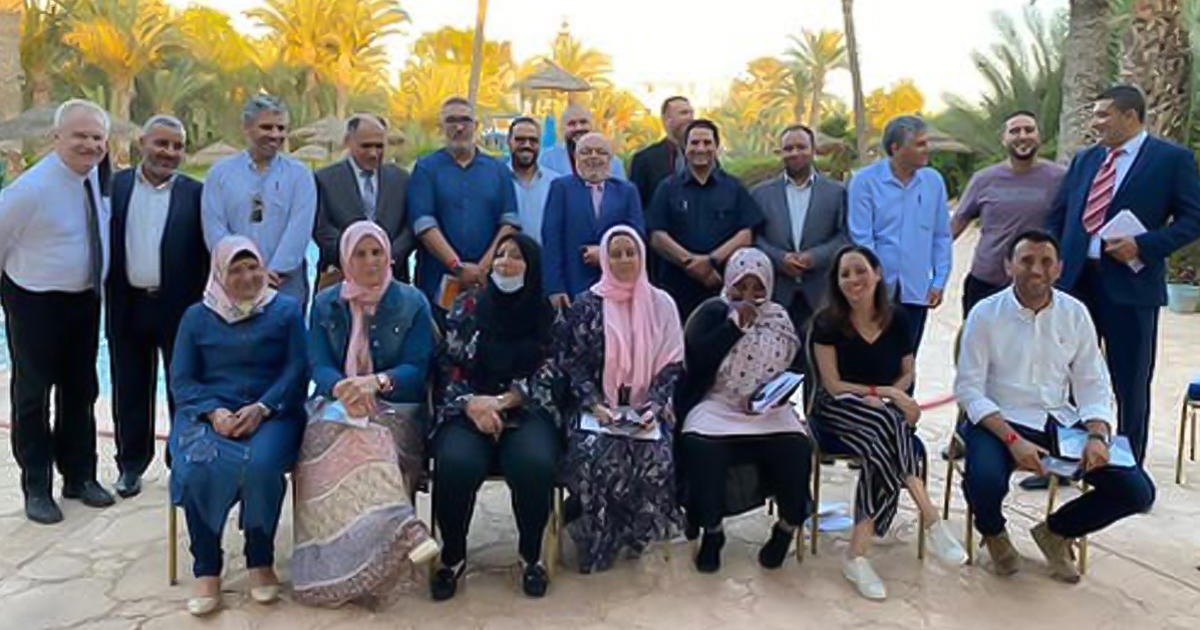Djerba, Tunisia, 9-11 June 2021
On 9-11 June 2021, No Peace Without Justice (NPWJ) and the Libyan Ministry of Justice, in collaboration with UNSMIL/Human Rights, Transitional Justice and Rule of Law Division and the UN Office of the High Commissioner of Human Rights, organised a three-day workshop to support Libyan authorities’ capacity to fulfil their obligations pursuant to the International Covenant on Economic, Social and Cultural Rights. Participants included 27 officials from 13 Libyan Ministries as well as the Higher Committee on Children.
The objective of the workshop was to support the Libyan officials to produce a “zero draft” of Libya’s report to be presented to the UN Committee on Economic, Social and Cultural Rights, the Treaty Body that monitors states’ implementation of the Covenant. This is the third time Libya will report on its implementation of the Covenant since ratifying the treaty in 1976. The workshop follows one year after Libya’s first Voluntary National Review on progress under the Sustainable Development Goals of the 2030 Agenda. This time, the government will be reporting on its development progress and challenges from the human rights perspective as an obligation of state under the Covenant.
Four experts guided the workshop: Bassam Aishi, veteran human rights trainer (Libya), Dr. Fathi Jarray, former Tunisian Minister of Education and Chairperson of the Tunisian Instance for the Prevention of Torture, Joseph Schechla, former OHCHR representative in Tunisia and coordinator of the Housing and Land Rights Network of Habitat International Coalition, and Frej Fenniche, former OHCHR senior human rights officer, currently MENA Regional representative of NPWJ.
“Given the complex task of reviewing the broad range of economic, social and cultural rights guaranteed under the Covenant, a multisectoral approach is required to assess the country’s performance of the treaty,” said Dr. Jarray. Mr. Schechla added that “respecting, protecting and fulfilling housing rights are central to Libya’s review, especially in light of the need to redress the dispossession and displacement endured by hundreds of thousands of Libyans since the country’s last report in 2004.” As stressed by the Permanent Representative of Libya to the UN in Geneva, H.E. Temim Baiou, who addressed the participants via video conference, “the submission of reports by the Libyan state is an obligation emanating from its ratification of the various human rights conventions. The creation of a National Mechanism on Reporting and Follow up to the recommendations would enable Libya, member of the Human Rights Council, to honor its human rights commitments”.
The workshop was organised in the framework of a project implemented by NPWJ with the financial support of the European Union, which aims at promoting a human rights approach within Libya’s legislative bodies and national authorities and supporting its efforts to fulfill its international obligations to Human Rights Treaties, including by submitting all its overdue reports to the relevant bodies and mechanisms and by implementing their recommendations.
For further information, please contact: Frej Fenniche: ffeniche@npwj.org – +216 56 441 505 (English, French, العربية)




